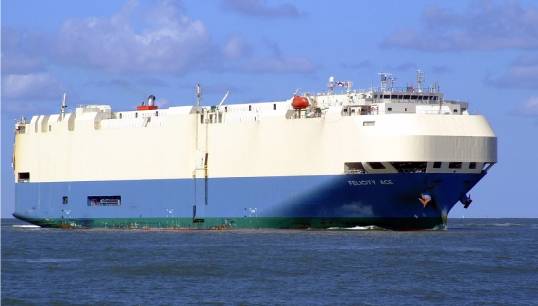- Topics
- Campaigning
- Careers
- Colleges
- Community
- Education and training
- Environment
- Equality
- Federation
- General secretary message
- Government
- Health and safety
- History
- Industrial
- International
- Law
- Members at work
- Nautilus news
- Nautilus partnerships
- Netherlands
- Open days
- Opinion
- Organising
- Podcasts from Nautilus
- Sponsored content
- Switzerland
- Technology
- Ukraine
- United Kingdom
- Welfare

In the wake of the Felicity Ace disaster, concerns are mounting over the safety of transporting electric vehicles at sea, with experts warning of deadly risks from lithium-ion batteries. Andrew Draper reports
Fresh questions have emerged about the safety of carrying electric vehicles (EVs) at sea following several fires involving lithium-ion batteries. US cargo carrier Matson said in July it was suspending the transport of electric and plug-in hybrid vehicles on its vessels. It said growing safety concerns around lithium-ion batteries were at play, but it would accept them again when 'appropriate safety solutions that meet our requirements can be implemented.'
Professor Emeritus Paul Christensen of Newcastle University told Nautilus he supposed it was 'only a matter of time before a major shipowner like Matson moved to suspend the transport of EVs and plug-in EVs due to increasing concern for the safety of transporting vehicles powered by large lithium-ion batteries.'
He said: 'The loss or major damage of the Felicity Ace, Fremantle Highway and Morning Midas may represent a tiny fraction of the sailings of such vessels, but the damage/loss of these giants has cost one life, as well as costing the owners hundreds of millions of pounds and contributing to the pollution of the oceans.'
Concerns raised
Mr Christensen flags up numerous concerns raised in the report into the Felicity Ace disaster by Panama Maritime Authority's General Directorate of Merchant Marine.
In February 2022 the 60,000gt car carrier, which was enroute from Emden, Germany, to the US, caught fire and burned for more than a week before recovery teams could board. It sank while being towed and is now on the bed of the Atlantic Ocean. The crew safely abandoned ship but the cargo – 3,965 luxury vehicles worth an estimated $330 million – was lost.
Professor Christensen, who runs a consultancy, Lithiumionsafety Ltd, said Panama's report raises 'more questions than answers'.
He said: 'The report postulates that a Porsche Taycan was the cause of the fire but focuses on the failure of the foam firefighting system, and the authors are clearly unaware of the fact that using foam would switch the hazard from fire to explosion as it could not stop thermal propagation inside the battery case of the vehicle, hence the venting of the vapour cloud.'
The report stated: 'As per the SMS (Safety Management System) paragraph 5.01.4: Any member of crew who discovers a fire, no matter how small, must raise the alarm immediately and attempt to extinguish the fire with appropriate equipment, if it is safe to do so.' The able seaman (AB) who discovered the fire after the smoke alarm was triggered called the third officer while trying to pick up a fire extinguisher.
'Essentially, the AB was prepared to commit suicide, showing the urgent need for EV-specific training in the marine industry,' Professor Christensen said, pointing out the inadequacy of fire extinguishers for EV battery fires. He notes the report's statement that 'no specific training is compulsory for car carriers and/or electric vehicle carriage.'
He also points to the report referencing that the charging battery level of vehicles was unknown to the crew. He said: 'It is not clear that the importance of this is clear to the author of the report. State of charge could be a determining factor in whether the hazard is fire or explosion.
'I remain significantly concerned that mariners' lives are at risk due to the lack of investment in research, crew training, PPE and ship design with respect to the carriage of EVs onboard marine vessels.'
Tags
More articles
Safety first? Share your concerns as a yacht professional
MAIB urges rethink on watchkeeping in 'the digital age' as collisions persist
The UK Marine Accident Investigation Branch (MAIB) has called for a fundamental reassessment of human watchkeeping practices following a series of serious collisions involving merchant vessels in 2024.
Seafarer happiness rises, but overshadowed by serious industry safety concerns
The Q2 2025 Seafarers Happiness Index, published by The Mission to Seafarers, shows a notable rise in crew wellbeing, with the average happiness score climbing to 7.54/10, up from 6.98 in Q1.
